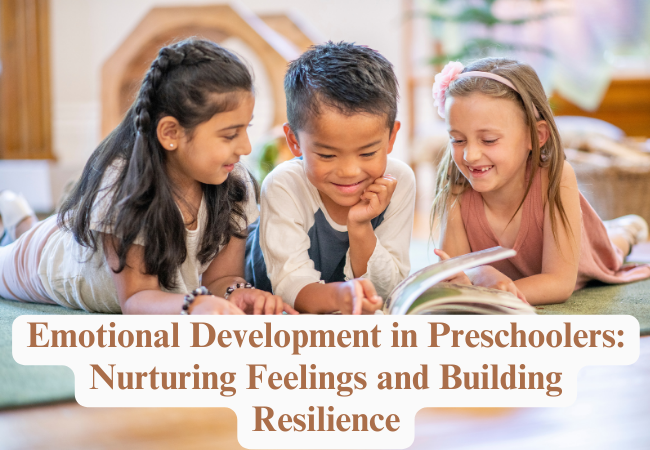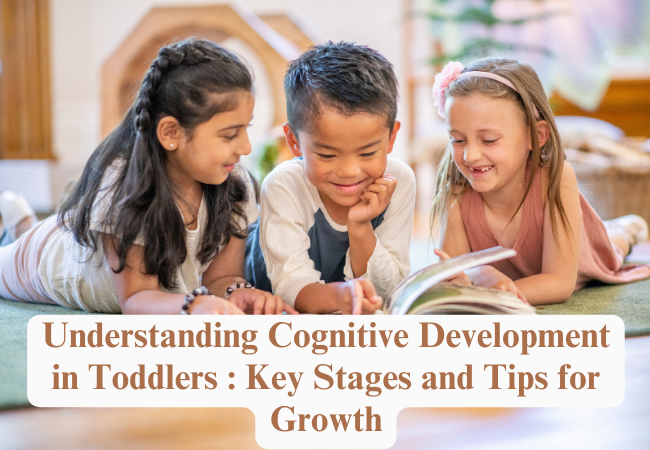Emotional Development in Preschoolers: Nurturing Feelings and Building Resilience
Explore the essentials of emotional development in preschoolers with our guide. Learn how to support your child’s emotional growth, from understanding and expressing feelings to developing resilience and empathy.
The preschool years are a crucial time for emotional development. Between ages 3 and 5, children begin to understand their own feelings and those of others. They start learning how to manage their emotions and develop empathy. As parents and caregivers, we play a vital role in supporting this emotional growth. This guide will help you understand emotional development in preschoolers and provide strategies to nurture their emotional well-being.
Why is Emotional Development Important?

Emotional development forms the foundation for:
- Building healthy relationships
- Developing self-confidence
- Succeeding in school and later in life
- Managing stress and challenges
- Understanding and respecting others’ feelings
Learn more about the importance of emotional development from the American Academy of Pediatrics
Key Aspects of Emotional Development in Preschoolers
1. Recognizing and Naming Emotions
Preschoolers are learning to identify different emotions in themselves and others.
What to expect:
- Can name basic emotions like happy, sad, angry, scared
- May struggle with more complex emotions
- Begins to recognize facial expressions and tone of voice
How to support:
- Use emotion words in everyday conversations
- Read books about feelings
- Play emotion recognition games
Tip: Create an “emotion chart” with faces showing different emotions. Help your child use it to express how they’re feeling.
2. Expressing Emotions
Preschoolers are learning appropriate ways to express their feelings.
What to expect:
- May have intense emotional reactions
- Struggling to control emotional outbursts
- Beginning to use words to express feelings
How to support:
- Validate their feelings
- Teach appropriate ways to express emotions
- Model healthy emotional expression
Tip: Create a “calm down corner” with soft toys, books and calming activities for when emotions run high.
3. Developing Empathy
Preschoolers are starting to understand that others have feelings too.
What to expect:
- Shows concern when others are upset
- May try to comfort others
- Still learning to see things from others’ perspectives
How to support:
- Encourage helping behaviors
- Discuss characters’ feelings in stories
- Point out how others might feel in different situations
Tip: Play “perspective-taking” games, like asking “How do you think your friend felt when…?”
4. Building Self-Esteem
Preschoolers are developing a sense of self and their abilities.
What to expect:
- Proud of accomplishments
- May compare themselves to others
- Developing preferences and interests
How to support:
- Offer specific praise for effort
- Provide opportunities for success
- Encourage independence
Tip: Create a “pride board” where your child can display their achievements.
5. Managing Emotions
Preschoolers are beginning to learn how to regulate their emotions.
What to expect:
- May use simple strategies to calm down
- Still needs adult help with strong emotions
- Learning to delay gratification
How to support:
- Teach coping strategies (deep breaths, counting to 10)
- Help identify triggers for strong emotions
- Practice patience and waiting
Tip: Create a “feelings thermometer” to help your child gauge the intensity of their emotions.
Discover more about emotional regulation in preschoolers
Strategies to Support Emotional Development
- Create a Safe Emotional Environment Children need to feel safe to express their emotions.
- Respond calmly to emotional outbursts
- Avoid dismissing or punishing feelings
- Show that all emotions are acceptable, even if all behaviors are not
- Use Emotion Coaching Help children understand and manage their emotions.
- Label emotions
- Validate feelings
- Help problem-solve
Example: “I see you’re feeling frustrated because the puzzle is hard. It’s okay to feel that way. Let’s take a deep breath and try again.”
- Model Emotional Intelligence Children learn by watching adults.
- Express your own emotions appropriately
- Talk about how you manage your feelings
- Apologize when you make mistakes
- Encourage Pretend Play Pretend play helps children explore different emotions and scenarios.
- Provide dress-up clothes and props
- Join in their play
- Ask questions about the characters’ feelings
- Read Books About Emotions Stories can help children understand and discuss feelings.
- Choose books featuring characters dealing with emotions
- Discuss how characters feel and why
- Ask how your child might feel in similar situations
Find a list of books about emotions for preschoolers
- Practice Problem-Solving Help children learn to resolve emotional conflicts.
- Encourage them to come up with solutions
- Discuss pros and cons of different choices
- Praise efforts to solve problems peacefully
- Establish Routines Predictable routines can help children feel secure and manage emotions better.
- Create consistent daily schedules
- Prepare children for changes in routine
- Use transitions songs or games
- Promote Physical Health Physical well-being contributes to emotional health.
- Ensure adequate sleep
- Provide nutritious meals
- Encourage physical activity
- Limit Screen Time Too much screen time can interfere with emotional development.
- Set clear limits on screen use
- Choose quality, age-appropriate content
- Engage in screen-free activities together
Read about the AAP’s recommendations on screen time for preschoolers
When to Seek Professional Help
While it’s normal for preschoolers to have emotional ups and downs, some may need extra support. Consider seeking professional help if your child:
- Has extreme or frequent emotional outbursts
- Shows signs of persistent anxiety or sadness
- Has difficulty forming relationships with peers
- Experiences a significant change in behavior or mood
Remember, early intervention can make a big difference in a child’s emotional development.
Learn more about when to seek help for your child’s emotional health
Conclusion
Emotional development in preschoolers is a complex and crucial process. By providing a supportive environment, modeling healthy emotional expression and using strategies to nurture emotional growth, we can help our preschoolers build a strong foundation for lifelong emotional well-being. Remember, every child develops at their own pace and what’s most important is creating a loving, accepting atmosphere where children feel safe to explore and express their emotions.
Do you have any experiences or tips about supporting emotional development in preschoolers? We’d love to hear from you in the comments below!
For more information and guide, visit usaparentingtips.com






